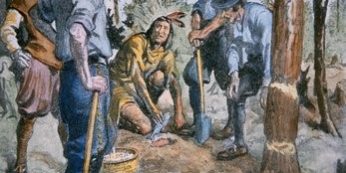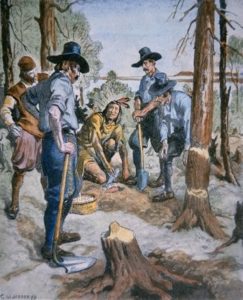 The story of Squanto is truly amazing. William Bradford called him “a special instrument sent of God for their good beyond their expectation.” Introduced to the Pilgrims by Samoset in March of 1621, his story of being captured by Thomas Hunt in 1614, being sent to Spain, gaining his freedom, learning English, and returning in 1619 only to find he was the sole survivor of the Patuxet tribe (where the Pilgrims settled) is a drama of epic proportions.
The story of Squanto is truly amazing. William Bradford called him “a special instrument sent of God for their good beyond their expectation.” Introduced to the Pilgrims by Samoset in March of 1621, his story of being captured by Thomas Hunt in 1614, being sent to Spain, gaining his freedom, learning English, and returning in 1619 only to find he was the sole survivor of the Patuxet tribe (where the Pilgrims settled) is a drama of epic proportions.
Bradford relates: “He directed them how to set their corn, where to take fish, and to procure other commodities, and was also their pilot to bring them to unknown places for their profit, and never left them till he died.” The story captivated the Pilgrims’ attention due to the apparent providential plan of God to help them when they needed it most.
Tisquantum was probably born around 1580 and was thus in his early 40’s when he met the Pilgrims. Not much is known about his early life. Bradford writes, “He was carried away with divers others by one Hunt, a master of a ship, who thought to sell them for slaves in Spain. But he got away for England and was entertained by a merchant in London, and employed to Newfoundland and other parts, and lastly brought hither into these parts by one Mr. Dermer, a gentleman employed by Sir Ferdinand Gorges and others for discovery and other designs in these parts.”
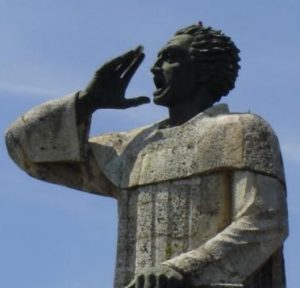 Squanto may have been helped by Spanish friars to gain his freedom so he could escape to England. Author David Silverman writes, “A group of friars blocked his sale, doubtlessly citing a Spanish law that had been in effect since 1542, though it was routinely ignored, that American Natives should not be enslaved.” That law was the result of the work of Bartolome de Las Casas. Las Casas had participated in slave raids in Hispaniola and Cuba. But in 1511 he was confronted with the gospel. He heard Dominican friar Antonio de Montesinos preach:
Squanto may have been helped by Spanish friars to gain his freedom so he could escape to England. Author David Silverman writes, “A group of friars blocked his sale, doubtlessly citing a Spanish law that had been in effect since 1542, though it was routinely ignored, that American Natives should not be enslaved.” That law was the result of the work of Bartolome de Las Casas. Las Casas had participated in slave raids in Hispaniola and Cuba. But in 1511 he was confronted with the gospel. He heard Dominican friar Antonio de Montesinos preach:
“I am a voice crying in the wilderness…the voice of Christ in the desert of this island…. You are all in mortal sin… on account of the cruelty and tyranny with which you use these innocent people. Are these not men? Have they not rational souls? Must not you love them as you love yourselves? Tell me by what right of justice do you hold these Indians in such a cruel and horrible servitude? …Why do you keep them so oppressed… in order to extract and acquire gold every day?”
After Las Casas was converted to Christ, he himself began to preach and work to have the oppression of natives outlawed by Spain. He said, “The church must be reminded that it is… the conscience of the state…and it must be the guide and the critic of the state… [I]f the church does not recapture its prophetic zeal, it will become an irrelevant social club without moral or spiritual authority.” He became the first priest (of Chiapas) ordained in the new world, officially given the title of “Protector of the Indians.”
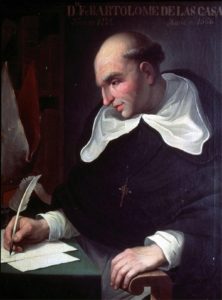 Though Las Casas petitioned Charles V (the same King who presided against Martin Luther) to end slavery, it was not until 1542 that Spain outlawed the enslavement of natives. Those who adhered to the detestable Doctrine of Discovery, the Papal Bull of 1452, which stated in part that colonizers were to “capture, vanquish, and subdue the Saracens, pagans, and other enemies of Christ… put them into perpetual slavery…. take all their possessions and properties,” turned to raiding Africa for slaves from that continent. Amazingly, the two contrasting theories of exploration – domination vs. service, or greed vs. gospel – converged in the life of Squanto. Squanto, however, would now experience the remnant gospel side of the story.
Though Las Casas petitioned Charles V (the same King who presided against Martin Luther) to end slavery, it was not until 1542 that Spain outlawed the enslavement of natives. Those who adhered to the detestable Doctrine of Discovery, the Papal Bull of 1452, which stated in part that colonizers were to “capture, vanquish, and subdue the Saracens, pagans, and other enemies of Christ… put them into perpetual slavery…. take all their possessions and properties,” turned to raiding Africa for slaves from that continent. Amazingly, the two contrasting theories of exploration – domination vs. service, or greed vs. gospel – converged in the life of Squanto. Squanto, however, would now experience the remnant gospel side of the story.
Squanto helped the Pilgrims communicate with Massasoit and maintain relative peace. He also helped negotiate for the return of John Billington, the boy who got lost in the woods and was taken by the Nauset as a hostage. The Nauset had attacked the Pilgrims on Cape Cod due to Thomas Hunt’s atrocities. Probably the greatest asset the Pilgrims had in Squanto was his ability to communicate in the art of trade, needed for the English to survive. Hobomok, the other guide who understood English, began to be jealous of Squanto, and the conniving nature of Tisquantum was revealed for all to see.
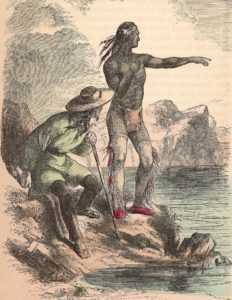 Bradford writes: “An Indian belonging to Squanto’s family came running in seeming great fear and told them that many of the Narragansetts, with Corbitant and he thought also Massasoit, were coming against them… no Indians appeared… Hobomok was confident for Massasoit, and thought all was false.”
Bradford writes: “An Indian belonging to Squanto’s family came running in seeming great fear and told them that many of the Narragansetts, with Corbitant and he thought also Massasoit, were coming against them… no Indians appeared… Hobomok was confident for Massasoit, and thought all was false.”
This pitting of one group against another, and endeavoring to convince Massasoit that the English had the plague buried and could use it whenever they wished, caused Bradford to assess Squanto’s character: “…they began to see that Squanto sought his own ends and played his own game, by putting the Indians in fear and drawing gifts from them to enrich himself, making them believe he could stir up war against whom he would, and make peace for whom he would.”
 On a trading expedition in late November 1622, the natives at first did not seem to want to trade. But, “by Tisquantum’s means better persuaded, they left their jealousy, and traded with them; where they got eight hogsheads of corn and beans… This gave our Governor and the company good encouragement…” As Bradford then relates, “So they put into Manamoyick Bay [now Pleasant Bay where Squanto is supposedly buried].… In this place Squanto fell sick of an Indian fever, bleeding much at the nose (which the Indians take for a symptom of death) and within a few days died there; desiring the Governor to pray for him that he might go to the Englishman’s God in Heaven; and bequeathed sundry of his things to sundry of his English friends as remembrances of his love; of whom they had a great loss.”
On a trading expedition in late November 1622, the natives at first did not seem to want to trade. But, “by Tisquantum’s means better persuaded, they left their jealousy, and traded with them; where they got eight hogsheads of corn and beans… This gave our Governor and the company good encouragement…” As Bradford then relates, “So they put into Manamoyick Bay [now Pleasant Bay where Squanto is supposedly buried].… In this place Squanto fell sick of an Indian fever, bleeding much at the nose (which the Indians take for a symptom of death) and within a few days died there; desiring the Governor to pray for him that he might go to the Englishman’s God in Heaven; and bequeathed sundry of his things to sundry of his English friends as remembrances of his love; of whom they had a great loss.”
Not only was Squanto “a special instrument sent of God for their good beyond their expectation,” but he may also have been the first convert to Christ among the natives to whom they witnessed. As Judge Davis wrote, “Governor Bradford’s pen was worthily employed in the tender notice taken of the death of this child of nature. With some aberrations, his conduct was generally irreproachable, and his useful services to the infant settlement entitle him to grateful remembrance.” Discerning the Providential blessings of God, and being a godly example of Christ to others, were two of the most important qualities that allowed the Pilgrims to be a remnant church plant that would eventually flower into our nation’s liberty.

